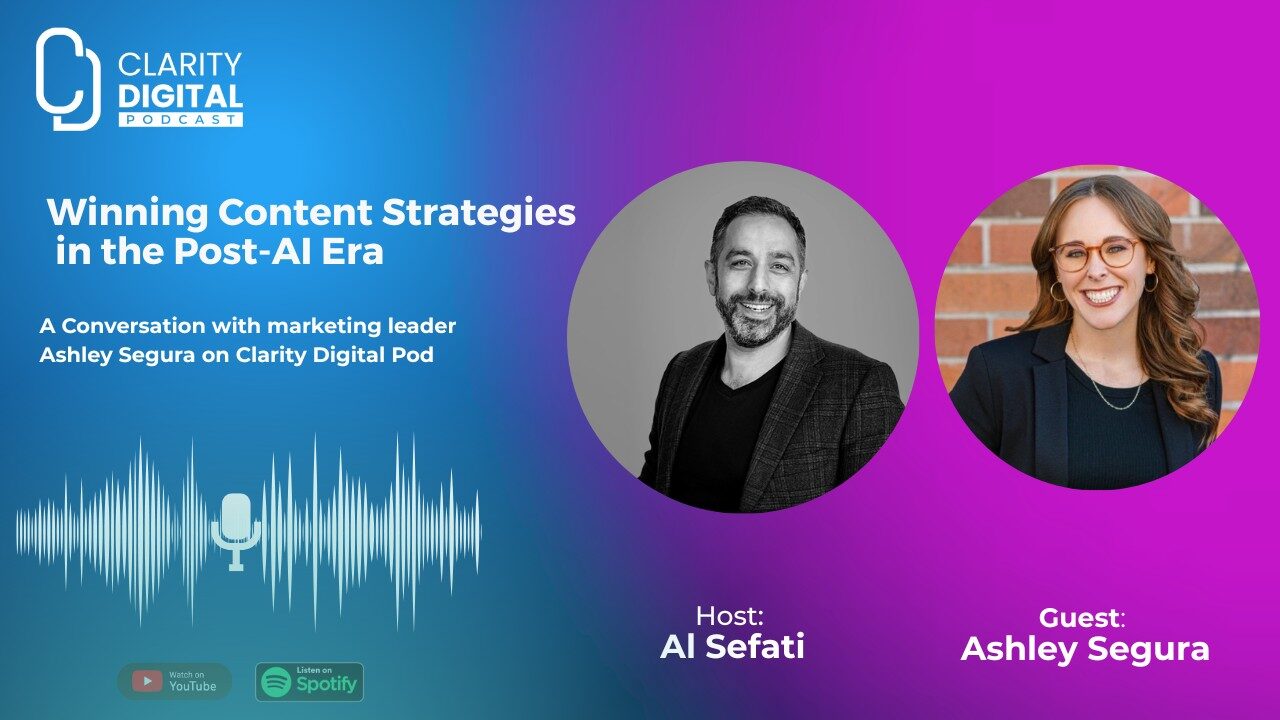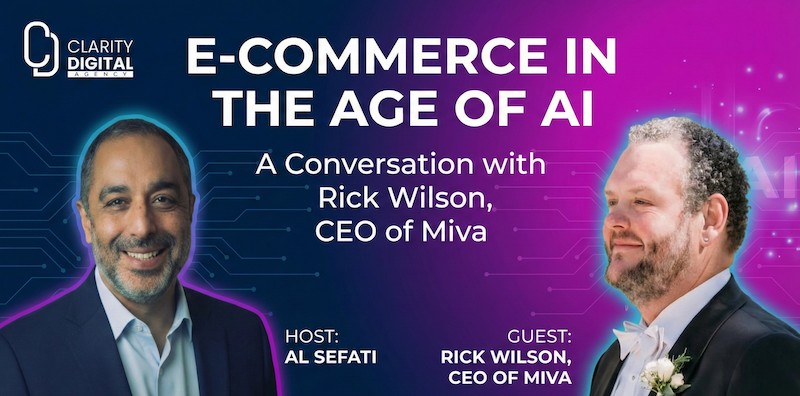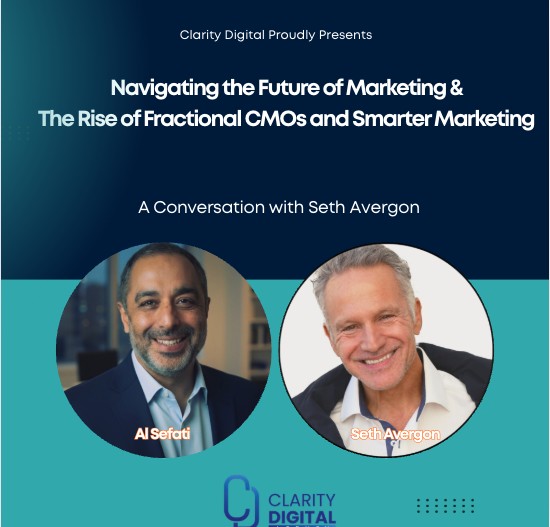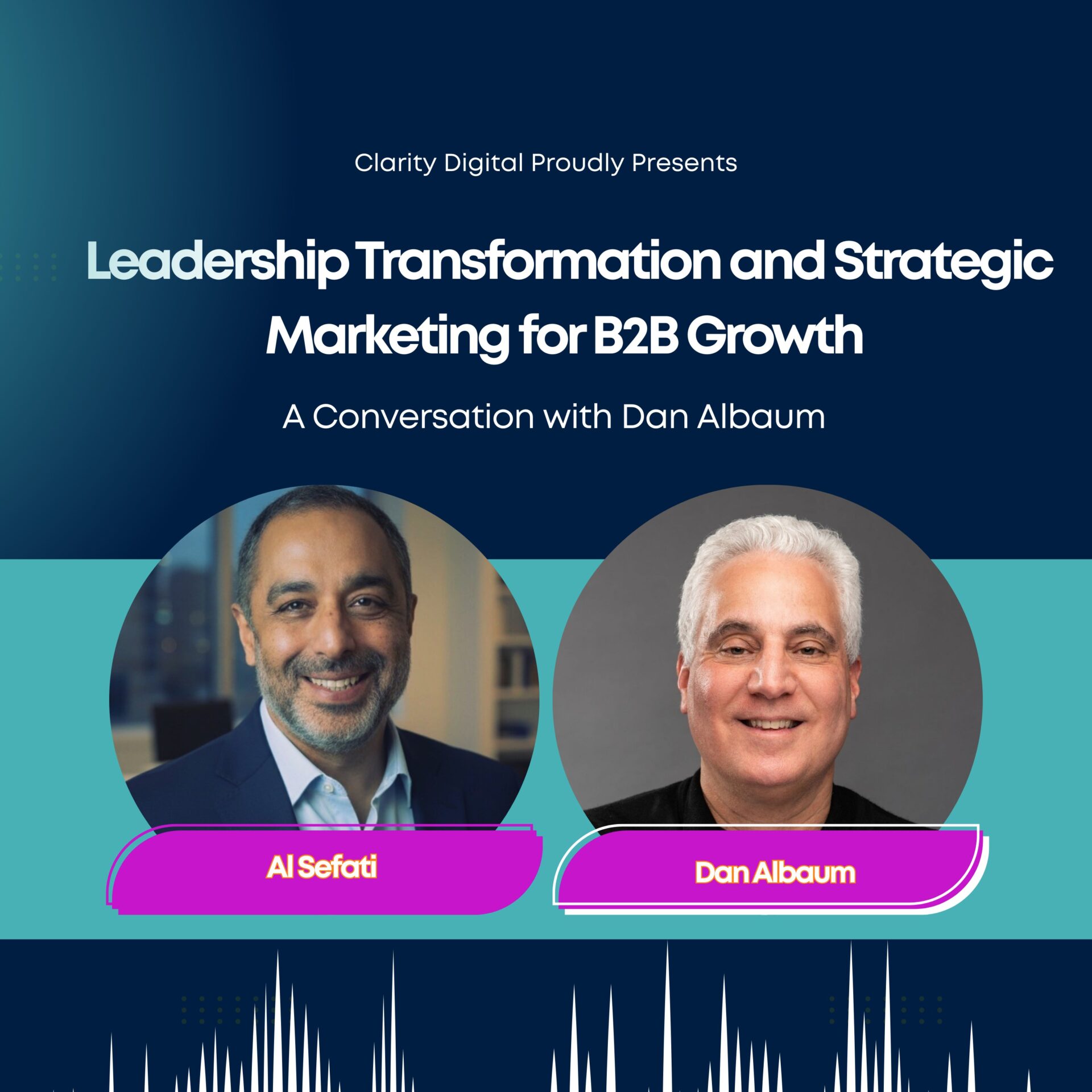In this episode of Clarity Digital Pod, I spoke with Ashley Segura, the Director of Marketing at Search Lab Digital. We discussed what works and what doesn’t in content strategy, SEO, and the evolving expectations of today’s audiences in a post-AI world.
Ashley has over 15 years of experience in digital marketing, having founded agencies and worked in-house at major SaaS companies like SEMrush. Whether targeting businesses or consumers, Ashley’s insights apply to both B2B and B2C marketing, emphasizing the need for today’s marketing to be useful, human, and continually improving.
We explored how AI is changing content creation, what brands need to adjust in their strategies, why traditional metrics like traffic are less effective, and how to balance education with entertainment in communications.
This episode is full of valuable insights, so let’s dive in.
Marketing Is Still About People; AI Just Changed the Workflow
Ashley emphasized that, whether marketing to businesses or consumers, it’s still about connecting with humans.
She explained the key differences between B2B and B2C content:
In B2C, short, impactful messages that evoke emotion or urgency often work well.
In B2B, the sales cycle is longer, the stakes are higher, and people want depth instead of fluff.
Yet, the foundation remains the same: content must resonate, and you need to meet people at their point in the journey. This is especially true in a digital space where AI tools are altering how individuals search, learn, and make decisions.
Ashley put it simply: you can’t just drop a “Book a Demo” CTA and expect results. Whether you’re selling a $20 product or a $200K software platform, providing the right content at the right time drives conversions.
Don’t Just Educate; Entertain!
A common area overlooked in content marketing, particularly in B2B, is tone. Many brands adopt a preachy, dry style that quickly loses interest.
Ashley highlighted examples like ClickUp, which combines educational and relatable content. They teach project management principles while making jokes, sharing workplace memes, and displaying personality.
This approach can apply to any brand. Even if you’re selling software to banks or gear to runners, you’re communicating with real people who have distinct personalities, interests, and preferences.
Today, some of these individuals prefer reading blogs, while others prefer short videos or deep dives. Others still enjoy memes. Your strategy should reflect these preferences.
The main point is that uninteresting brands lose attention. Find your tone and vary your content formats.
AI as a Coworker, Not a Creator
|We also discussed AI and how it’s changing the entire content process, from ideation to execution.
Ashley made a vital point: AI should serve as a collaborator, not a content creator. She uses tools like ChatGPT to evaluate strategies, point out missing elements, and streamline operations. However, she doesn’t depend on it for final content—and she’s not alone.
We’ve both noticed the difference between AI-generated content and material crafted by experienced marketers. One engages; the other merely fills space.
The smartest marketers use AI to:
- Test strategies
- Generate outlines
- Explore new ideas
- Speed up research
- Automate repetitive workflows
However, AI still lacks voice, tone, and nuance. It can’t gauge emotional connections. If you’re focused on long-term brand value, the human touch is essential.
The SEO Game Has Changed; Again
We also discussed SEO and its rapid changes due to AI.
People no longer just go to Google. They ask ChatGPT, Gemini, and Perplexity for answers. This shift changes how people find content and how marketers should enhance visibility.
Ashley stressed that traditional metrics like traffic and rankings are becoming less useful. What matters now includes:
- Brand visibility across various platforms
- Share of voice in your niche
- Mentions in relevant media and industry publications
- Consistent content quality and originality
I agree. In our agency, we’ve noticed how unpredictable traffic has become, especially as AI-powered search alters how answers are sourced.
The key takeaway? Focus on your brand, not just keywords. Create content that people trust, remember, and share—not just content that ranks today but fades away tomorrow.
PR Is the New Link Building
A particularly tactical takeaway from our conversation centered on digital PR.
Links used to be everything, but now mentions and credibility are just as important, if not more so.
Ashley noted more marketers recognize the value of genuine press coverage—not just “link building.” Whether it involves podcast appearances, bylines in trade publications, or getting featured in listicles, being mentioned matters.
We’ve seen this trend as well, which is why our agency created a dedicated digital PR program. Nowadays, your SEO success relies not only on your own content but also on what is being said about you online.
Tools That Actually Work
Here’s a quick list of tools Ashley recommends—many of which I also find useful:
- Screaming Frog – for site and content audits
- SEMrush & Ahrefs – for keyword research, monitoring, and ideation
- Blaze.ai & Jasper – for AI-driven content support
- SparkToro – for audience insights and persona development
- Power BI dashboards – to aggregate data from multiple tools into one actionable source
We also discussed creating custom GPTs and internal tools—a project I’ve been pursuing using make.com and custom agents. If you understand how to craft prompts and manage your workflows, you don’t need a whole development team to create something valuable today.
A tip for marketers: Learn to build lightweight tools. Prompt engineering and agent workflows will be key moving forward.
It’s an Exciting Time; If You’re Willing to Evolve
We concluded with a discussion about mindset.
Ashley accurately stated that it’s an exciting time to be a marketer if you’re open to change.
Everything is evolving—AI, SEO, content formats, and measurement. That’s part of the job. If you work in marketing and struggle with change, this might not be the right field for you.
As I often say, to thrive in this industry, you need to be social, have a touch of ADHD, or be very humble—preferably all three. Because everything in digital is always in motion.
A Quick Look at Ashley’s World
Ashley leads marketing at Search Lab Digital, a performance-driven agency based in Chicago. She lives in Bend, Oregon (formerly San Diego), and enjoys mountain biking, the outdoors, and the active lifestyle that comes with living near the Deschutes River.
Though she isn’t consulting on the side right now, she plans to return to speaking soon. If you see her at an event, be sure to say hello. She’s one of the sharpest minds in the field.
Final Thoughts: Whether in B2B, B2C, or somewhere in between, content marketing in 2025 is all about human connection, clear strategy, and smart technology use.
Key takeaways:
- Content must align with the buyer’s journey, regardless of the business model
- AI is a strong assistant, not a substitute for human creativity
- SEO is shifting focus from traffic to visibility and trust
- Digital PR and brand mentions are more crucial than ever
- Build your own tools whenever possible; the opportunity is there
A big thank you to Ashley Segura for sharing her insights. Her perspective is practical, grounded, and forward-thinking—all essentials for modern marketers today.





